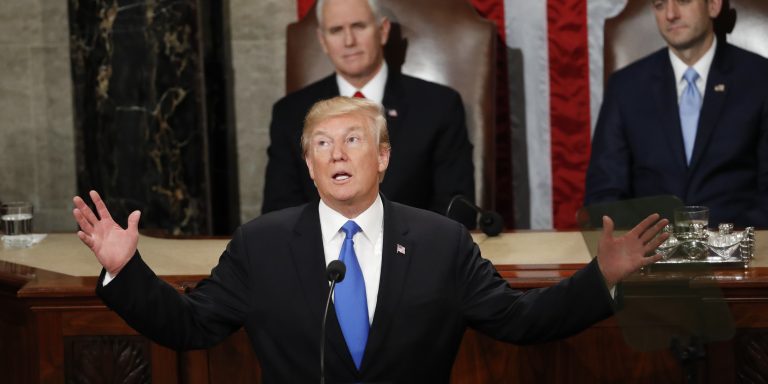INTELBRIEF
January 31, 2018
IntelBrief: The State of the Union

- On January 30, President Trump delivered his first State of the Union address, at a time of nearly unprecedented social and political division in the United States.
- The address focused on a vision of America that looks to an overly-idealized past to determine how the administration wants to face the future.
- As customary in such speeches, rather than give specific policy initiatives, President Trump made sweeping statements, with a consistent focus on economic growth and restricting immigration.
- There were no marked changes in the administration’s rhetoric towards North Korea and Iran, the two countries specified as national security threats.
In his first State of the Union address, President Trump proclaimed that the United States is strong, touting his administration’s accomplishments in his first year in office. As with most State of the Union addresses, the President spoke almost entirely in generalities, with a plethora of goals mentioned in short aspirational statements. Nothing of note was said with respect to national security and foreign relations.
‘America First’ was a consistent theme. The president focused on trade deals he said would be renegotiated to be more ‘fair’ to the U.S. While no specifics were given—other than a reference to China and unfair trade deals—a preference for bilateral deals over multilateral agreements has been a constant for this president. ‘America First’ was also mentioned in the context of immigration, a subject where the president did provide specifics. He stated that his administration would push for immigration reform that focused on four pillars: providing a 12-year path towards citizenship for up to 1.8 million people brought to the country as minors; ‘securing’ the southern border with a wall; ending the visa lottery and replacing it with an unspecified system based on ‘merit’ and economic potential; and limiting the sponsorship of family members of immigrants to spouses and minor children.
The speech highlighted the administration’s belief that only by returning to an overly-idealized past, with a strong focus on industry and economic growth, could the United States have a successful future. The notion that the country has not been ‘great’ for some time—and only in the last year regained the self-respect, optimism, and vision to return to previous heights—is at odds with previous administrations, but entirely consistent with President Trump’s rhetoric and political stances both during the campaign and in his first year in office.
The speech comes at a time of nearly unprecedented political division in the U.S. The special counsel is still investigating Russian influence in the 2016 campaign and possible illegal dealings by campaign and administration officials related to those Russian efforts. The Trump administration and its supporters, along with a well-documented Russian twitter bot campaign that is ongoing, have sought to attack the Federal Bureau of Investigations (FBI) and the Central Intelligence Agency (CIA) as elements of a ‘deep state’ that is seeking to undermine the president. The recklessness and damage of such an orchestrated campaign against non-political government institutions is truly devastating to the social and political fabric. President Trump, as expected, made no mention of the Russian investigations and concerns in his speech. Indeed, while the president used this speech to once again criticize the landmark Iran nuclear deal—and recently imposed further sanctions on Iran—he mentioned Russia only once. The president has ignored attempts by Congress to punish Russia with sanctions for election meddling.
The statements and promises of this speech will soon be overshadowed by the inevitable political realities of a divided Congress, and by domestic and international events that cannot be anticipated. Based on the speech, however, likely not much will change with respect to U.S. foreign policy. America’s waning relationship with the EU, especially on issues like climate change, will continue. Russian disinformation campaigns and cyber-enabled interference in Western democracies, and the administration’s lack of willpower to fight it will continue. The battle against the so-called Islamic State will continue, along with the war in Afghanistan. The immoral and inefficient detention facility at Guantanamo will continue to fail to bring accused terrorists to justice. The rhetoric of ‘us versus them,’ which have come to define U.S. society, will likely intensify with the approaching mid-term elections. While the president’s speech called for some measure of unity in the country and in Congress, it is likely that only more division lies ahead.
For tailored research and analysis, please contact: info@thesoufancenter.org
[video width="960" height="540" mp4="https://thesoufancenter.org/wp-content/uploads/2018/01/Final-Edit-1-121.mp4" poster="https://thesoufancenter.org/wp-content/uploads/2018/01/AP_18031127158423.jpg"][/video]